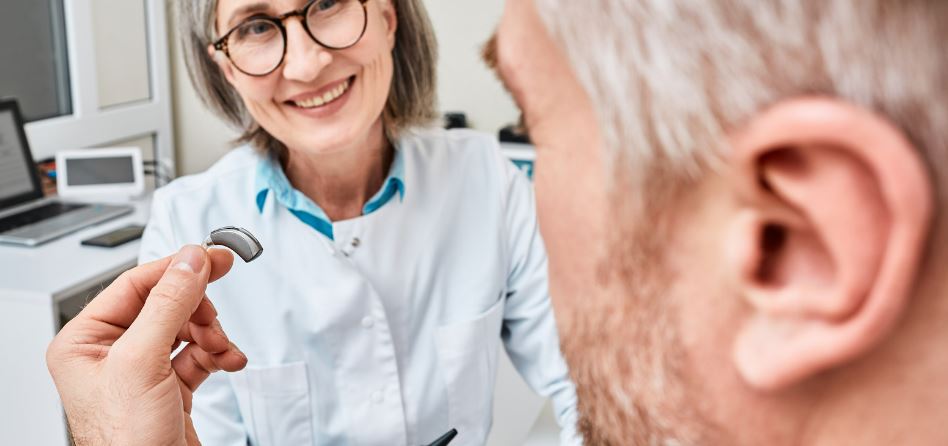Colder, shorter days and the cost-of-living crisis are putting those with hearing loss at higher risk of loneliness and isolation, say BIHIMA and the Marmalade Trust.
A growing number of people with hearing loss are at risk of isolation this winter, according to BIHIMA, the British and Irish Hearing Instrument Manufacturers Association, and the Marmalade Trust, a charity dedicated to raising awareness of loneliness. However, research suggests that hearing instruments can drastically lower an individual’s propensity for loneliness.
UK EuroTrak data1 found that the use of hearing instruments led to more job satisfaction and opportunities, lower risk of depression, better quality of sleep and less exhaustion in the evenings: all factors that can have an enormous impact on an individual’s ability to socialize and benefit from the company of others.
In addition, according to Age UK2, 1.4 million older people in the UK are often lonely. We also know that age-related hearing loss affects approximately 30-35% of adults between the ages of 65 and 75, and this number increases to over 50% for those over the age of 753. These elements combined mean that there is a significant proportion of people vulnerable to the ripple effects of isolation this winter.
“The links between loneliness and hearing loss are extensive. Hearing loss impairs communication and the ability to socialise which can lead to people avoiding social situations entirely. This is currently being compounded by the colder, darker days ahead and the continuing cost of living crisis – the reality is that more and more people are spending prolonged periods of time alone, and this is a considerable problem for those living with hearing loss”
–BIHIMA Chairman Paul Surridge
 Martin Green, the Regional Director at the Marmalade Trust, expressed concern over the challenges of maintaining connections during the shorter, colder winter days.
Martin Green, the Regional Director at the Marmalade Trust, expressed concern over the challenges of maintaining connections during the shorter, colder winter days.
“It isn’t easy trying to maintain a sense of community and connection as the days grow shorter and the temperatures drop in winter,” noted Green. “The festive season, often associated with warmth and togetherness, can ironically amplify the sense of loneliness for those who don’t have a supportive social network.”
Daniela Silcock, Head of Policy Research at the Pension Policy Institute (PPI), highlighted how the rising cost of living, especially in housing and energy, disproportionately affects pensioners. She emphasized that older individuals, typically aged 66 and above, allocate an increasing portion of their income to essentials like housing, bills, and food, leaving less for transportation or leisure activities as they age.
Hearing Loss, Loneliness and Social Isolation
Loneliness and social isolation are widespread issues and can affect a person at any age. A 2022 study by HARTMANN4 found that a proportion of every age group often (or always) felt lonely. Similarly, the BBC’s Loneliness Experiment5 found that 40% of young people now feel lonely vs 27% of over 75s.
While there are many factors that impact a person’s tendency for loneliness, there is a significant body of research which suggests that hearing impairment can accentuate social isolation.
With evidence from the National Institute of Health Research connecting loneliness and depression6 with untreated hearing loss, it’s clear that this is a problem with widespread repercussions.
“Hearing loss can affect many different aspects of a person’s life, and no one should have to feel isolated or lonely because of their hearing. We know that wearing hearing instruments helps people’s ability to communicate and, therefore, can potentially help reduce those levels of loneliness – in fact, 63% of respondents in our Eurotrak study said that hearing instruments improved their overall ability to communicate more effectively in most situations. It also found that 54% could participate more in group activities and 52% experienced improvements within their social life”
–BIHIMA Chairman Paul Surridge
BIHIMA is, therefore, calling on those with hearing loss to prioritize hearing tests and adequate hearing care in order to minimize their risks of loneliness and isolation.
“Taking early action on hearing loss can help prevent these issues, which is why we are calling for free hearing checks from the age of 40. By raising awareness and helping people access the support they need for hearing loss, we can help reduce issues like loneliness and enrich people’s lives,” said Surridge.
However, hearing instruments aren’t the full solution – they are a part of it.

“Loneliness can be an uncomfortable feeling, one we might want to push away or ignore. It’s important to remember that loneliness is a completely normal emotion – it’s our brain’s way of letting us know we’re in need of meaningful connection,” commented Martin Green, Regional Director at the Marmalade Trust. “Loneliness can often feel overwhelming and something out of our control, so it can be useful to have a starting point.”
“We’ve developed a three-step approach: Noticing and acknowledging your feelings of loneliness, taking time to learn about what kinds of connections make you feel better, and then taking action to foster connection will help you manage feelings of loneliness this winter.”
–Martin Green, Regional Director at the Marmalade Trust
Top Tips for Reducing Winter Loneliness
BIHIMA and the Marmalade Trust are encouraging those with hearing impairments to take the necessary steps and to put in place the right coping strategies to combat loneliness this winter.
1. Remember you’re not alone
“Loneliness is likely to be experienced by all of us at some point in our lives and talking to others about it can remind us that it’s a totally normal thing to feel. It could be a nice idea to have a frank and honest conversation with someone you trust about times when you might have experienced loneliness and be open to hearing their experiences too.” – Martin Green, the Marmalade Trust.
2. Keep moving
“Being active releases chemicals in the brain that can help us to feel better. For those with hearing loss, engaging in sporting activities – especially those in a group – is a great way to minimise propensity for loneliness. UK Deaf Sport has a directory which signposts people to activities in their local area and provides an excellent way to meet other people with hearing loss.” – Paul Surridge, BIHIMA.
3. Take a social media break
“It’s proven that the more time you spend on social media, the greater your social anxiety becomes. It’s sometimes hard to stop comparing ourselves to others. But remember that things aren’t always what they seem from the outside. Take a break from all these channels where festive cheer is at an exaggerated high, and instead spend the time nurturing your own passions and interests.” – Martin Green, the Marmalade Trust.
4. Spread some festive cheer
“We know that coming to terms with hearing loss can feel very isolating, especially after diagnosis. Even once hearing instruments have been fitted, there’s a transition period that can leave the wearer feeling detached. Volunteering can be a brilliant way to gently step back into the mainstream world. There are countless hearing loss charities that are in need of compassionate volunteers, particularly if they have a personal connection to hearing loss.” – Paul Surridge, BIHIMA.
5. Make a new tradition
“While the festive period can feel like a time full of social pressures, it’s also a time when opportunities to try new activities increase tenfold! Have a look at the festive offerings in your area, and don’t be afraid to go along by yourself – take advantage of the chance to meet and chat with new people.” – Martin Green, the Marmalade Trust.
6. Communicate to your family and friends how they can better support you.
“Our UK Eurotrak study found that two of the biggest influences on someone who is seeking treatment or support for hearing loss are their partner or an audiologist. This shows that people connected to someone with hearing loss have a role to play. It’s important to speak to loved ones about how they can best support you; both in the way they communicate and emotionally. This will look different for everyone, so take the time to consider what you need.” – Paul Surridge, BIHIMA.
About BIHIMA:
BIHIMA aims to raise the awareness of hearing loss and the impact it has on society. Our members’ aim is to invest in research and development to ensure hearing instruments are designed and manufactured using the latest technology, to positively change the lives of people with hearing loss.
About the Marmalade Trust:
Marmalade Trust is a leading loneliness charity for all ages and the only charity in the world specifically dedicated to raising awareness of loneliness. To find out more about their mission, visit: www.marmaladetrust.org.







